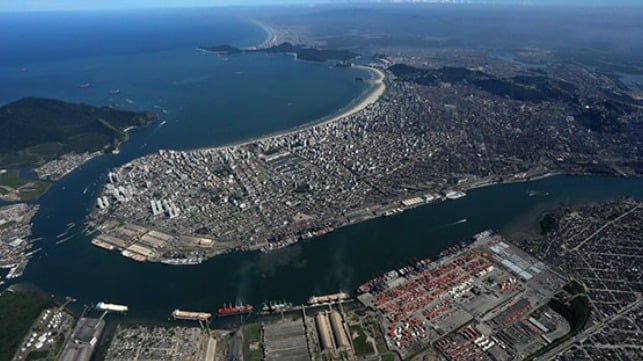Brazilians Seek to Block Maersk and MSC from Santos Port Privatization

As Brazil prepares to move forward with the next phase of its privatization efforts for port operations, the independent terminal operators are working to block shipping giants Maersk and MSC from participating in the auction. At stake are the rights to one of the crown jewels in Brazil’s portfolio, a nearly 150-acre site in Santos for a new container terminal Cais do Saboó, more commonly called STS10.
Brazil has been systematically auctioning off port facilities around the country. The program is designed to raise badly needed funds for the country while also supporting efforts to expand and modernize the ports. The Santos Port Authority has been working to expand the capabilities of the port announcing in 2021 that they had completed efforts to significantly increase the size of containerships calling at the port from 9,000 TEU to 14,000 TEU. Santos currently handles approximately 4.4 million TEU annually and the new terminal will play a key part in the planned growth to 7.9 million TEU by 2040.
The government in March 2022 published the preliminary terms for the auction for STS10 despite efforts by the trade association representing the independent terminal operators to block the release of the prospectus. They fear market concentration if the major shipping companies were to take over the operation of the terminal and possibly too much capacity that would also hurt the independent operators. The government promised a thorough comment period before finalizing the terms of the auction, which is expected to proceed in the fourth quarter of 2022.
While the government refused to delay the process, they did include a restriction preventing the major carriers from joining together to bid for the terminal. Maersk and MSC currently are joint venture partners in the Brasil Terminal Portuario in Santos and have interests in terminals in other ports around the country. The independent operators fear that the two companies would partner for the new terminal and if successful in their bid would dominate the market. They highlight that Maersk and MSC currently account for 60 percent of the container volume that comes to Brazil.
The dispute is heating up with the Brazilian newspaper Valor Econômico reporting that it was likely heading to the courts to decide the questions of market concentration.
“It's a complaint against the closing of the market that is in progress due to the dominance of these economic groups,” said Jesualdo Silva, president of The Brazilian Association of Port Terminals (ABTP), which represents 72 companies involved in port operations. Silva said after regulators rejected their arguments of concentration that the organization is now preparing a complaint for the courts to decide the questions of the performance of companies across the country.
ABTP says that if Maersk and MSC were permitted to operate the new terminal they would naturally direct volumes to that terminal hurting the independent operators. They are calling the shipping companies' business practices abusive and that this move would further permit them to consolidate their positions.
The decision to possibly take the matter to the courts came after one of Brazil’s chief regulatory bodies, the Administrative Council for Economic Defense (CADE) issued a technical note stating that the vertical integration of shipowners with port terminals does not harm competition. CADE rejected proposals from the Brazilian Association of Customs Terminals and Premises (ABTRA) that would have prevented Maersk and MSC from participating in the auction.
“Vertical integrations can generate pro-competitive effects such as reducing transaction costs with the combination of complementary activities, which can be reversed to improve and innovate products and processes, increasing the company's economic efficiency, and providing gains in terms of prices. and quality to consumers,” Cade concluded in its review.

that matters most
Get the latest maritime news delivered to your inbox daily.
For their part, both Maersk and MSC reject the accusations of concentration. They point out that the current terminal is space constricted. Maersk contends that most of its volumes are handled by the independent operators and that the new space is required for further growth. MSC rejected claims that it would arbitrarily direct volumes to its terminal saying that containers are moved under long-standing terminal contracts and ships can not be redirected at will.
Both of the large carriers have made expansion of their terminal operations a key part of their business strategies. Expanding the terminal operations is central to the transition from shipping companies into integrated logistic providers.
